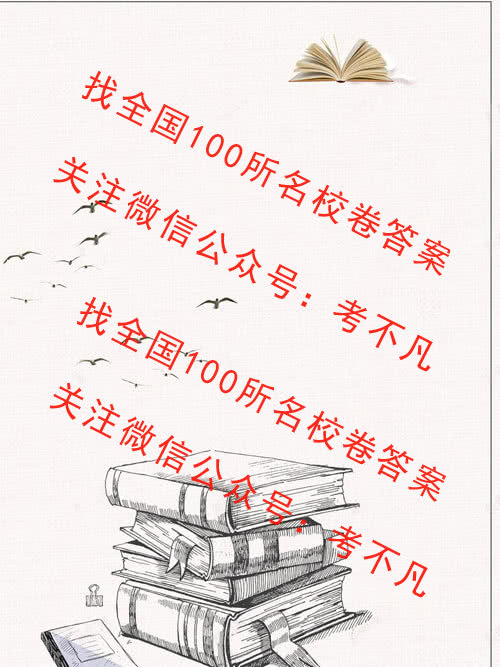单元测试示范卷
2023全国100所名校单元测试示范卷英语/卷二高一
2023全国100所名校单元测试示范卷英语/卷二高一,我们目前收集并整理关于2023全国100所名校单元测试示范卷英语/卷二高一得系列试题及其答案,更多全国100所名校单元测试示范卷试题及答案,请关注微信公众号:考不凡

1、2023全国100所名校单元测试示范卷一高一英语
2、2023全国100所名校单元测试示范卷·高三·英语卷七
3、2023卷临天下《全国100所名校单元测试示范卷》·高三物理·全国人教Y卷
“Tear them apart!” “Kill the fool!” “Murder the referee(裁判)!”
These are common remarks one may hear at various sporting events. At the time they are made,they may seem innocent(无辜的,天真无邪的) enough. But let's not kid ourselves.They have been known to influence behavior in such a way as to lead to real violence. Books have been written about the way words affect us. It has been shown that words having certain meanings may cause us to react in ways quite foreign(陌生的) to what we consider to be our usual behavior. I see the term “opponent” as one of those words. Perhaps the time has come to delete it from sports terms.
The dictionary meaning of the term “opponent” is “enemy”, or “one who opposes your interests.” Thus, when a player meets an opponent, he or she may tend to treat that opponent as an enemy. I remember an incident in a handball game when a referee refused a player's request for a time out for a glove change because he did not consider them wet enough. The player went away to rub his gloves across his wet T-shirt and then screamed, “Are they wet enough now?”
In the heat of battle, players have been observed to throw themselves across the court without considering the effect that such a move might have on anyone in their way. I have also witnessed a player reacting to his opponent's intentional and illegal blocking by hitting him with the ball as hard as he could during the course of play. Off the court, they are good friends. Does that make any sense? It certainly gives proof of a court attitude which differs from normal behavior.
Therefore, I believe it is time we elevated(提升)the game to the level where it belongs, setting an example to the rest of the sporting world. Replacing the term “opponent” with “associate” could be a good way to start.
The dictionary meaning of the term “associate” is “friend” or “companion.” You may soon see and possibly feel the difference in your reaction to the term “associate” rather than “opponent”.
1.What did the handball player do when he was not allowed to change his gloves?
A. He refused to continue the game.
B. He angrily hit the referee with a ball.
C. He insisted that the referee was unfair.
D. He wet his gloves by rubbing them across his T-shirt.
2.According to the passage, players in a game may ______.
A. throw the ball at the opponent illegally blocking their way
B. keep on screaming and shouting throughout the game
C. 1ie down on the ground as an act of protection
D. kick the ball across the court with force
3.What is the fourth paragraph mainly about?
A. The player's eagerness to win.
B. The player's bad behavior.
C. The player's attitudes towards the game.
D. The player's totally different behavior on and off the court.
4.What can be concluded from the passage?
A. Players should be educated to respect referees on the court.
B. Replacing the present terms on the court can help reduce violence.
C. Raising the referee's sense of responsibility can help reduce violence.
D. Changing the attitude of players on the sports field can help reduce violence.
试题答案
1.D
2.A
3.D
4.B
【解析】
试题分析:本文讨论的是语言对行动的影响问题。开篇是三个耸人听闻的句子:撕碎他们,宰了那个白痴,杀了裁判。可以说以震撼效果吸引了读者注意,同时也引出了语言这个论题,而这些句子本身又是常现于体育场的,这就提示了本文所讨论语言的范围。
1.细节理解题。本题所说的手球队员是作者在第三段所举的一个例子:I recall an incident in a handball game when a referee refused a player’s request for a time out for a glove change because he did not considered then wet enough. The player proceeded to rub his gloves across his wet T-shirt and then exclaimed. “Are they wet enough now?”这句话的大意是在一场手球比赛中一个球员请求暂停来换手套(request for a time out for a glove change),但裁判认为手套不够湿拒绝了他的请求。他便把手套在湿T恤上搓湿,并反问裁判手套够不够湿。显然D的意思是对的。这里没有提到他是否拒绝继续比赛,他绝对没有把球扔向裁判(除非他想被当场驱逐出场),这里不能和第四段的例子混淆(deliberately hitting him with the ball as hard as he could)。 故选D。
2.从四个选项来看,题目问的是球员们在比赛场上的具体反应,而在文中具体的例子实际上只有两个,第一个是第三段的搓手套的例子,第二个是第四段的故意把球扔到 对手身上的例子。而第一个例子在上一道题中已经考查过了,这一道题继续考查的可能性不大。由此判断此题的答案只需要看第二个例子就可以了。第二个例子是故 意扔球, B、C在文中都没有提到,可以排除,D是说把球踢走,而不是把球扔到对手身上,也不对。故选A。
3.例说明了上述根本原因会导致失常行为的发生:一个球员故意把球狠狠地砸向了非法阻挡他的对手身上,而这个对手在日常生活中还是他的朋友。 故选D。
4.在阐明了语言与行为的这种关系之后,作者在最后两小段提出了自己的倡议。前一小段提出以associate替代opponent,最后一段展望了associate所能带来的实际益处。故选B。
考点:日常生活类阅读

本文由 全国100所名校示范卷答案网 作者:admin1 发表,转载请注明来源!
 admin1
admin1![2024届高三全国100所名校AB测试示范卷·化学[24·G3AB(新教材老高考)·化学-SJB-必考-FJ]七试题](https://100-1301705331.file.myqcloud.com/pic/2024ab.jpg!100sy)